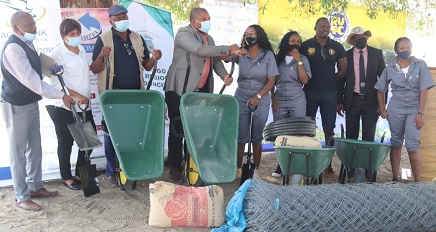
Taking stock of South African livestock import requirements
Livestock farmers were awoken to a rude reality when livestock exports towards South Africa were abrutdly suspended. While it initially appeared that the requirements were meant to keep Namibian meat out of South Africa, BLNS countries will find themselves in a similar predicament when the Department of Agriculture, Forestry and Fisheries introduce requirements that intends to protect livestock producers at home.
Willemien Viljoen of tralac, a capacity building organisation developing trade related capacity in east and southern Africa discusses recent amendments to South Africa’s import requirements for livestock emanating from BLNS countries.
She writes, “On 17 April 2015 the South African Department of Agriculture, Forestry and Fisheries (DAFF) published proposed revised import requirements for live cattle, sheep and goats imported from Botswana, Lesotho, Namibia and Swaziland (BLNS). According to the notice the revision was necessary to ensure consistency with the World Trade Organization (WTO) Agreement on the Application of Sanitary and Phytosanitary (SPS) Measures.
“The requirements in the draft certificates for sheep and goat imports are organized in the same fashion as the requirements for cattle imports, origin and destination of animals, animals originate from a country or zone free from specified diseases and the testing and vaccination requirement for each animal,” she said. Said Viljoen, “This is not the first publication of the revised requirements. These requirements first came to light on 3 February 2014 when letters were sent to various interested parties indicating that the requirements will come into effect on 1 May 2014. However, this method of notification and an inadequate consultation process led to a successful objection and the subsequent suspension of the implementation of the amended requirements.
After the initial publication of the proposed amendments in 2014 the Namibia Livestock Producers Organisation (LPO) stated that the biggest obstacle posed by the new import requirements relates to blood tests that need to be done on every animal. This requirement was questioned seeing that Namibia has a higher internationally accepted veterinary status than South Africa Viljoen established.
Viljoen believes the measures will have devastating consequences for the Namibian meat industry. “In 2014 South Africa imported approximately US$16 million and US$32 million worth of sheep and goats and cattle, respectively. The majority of these were imported from Namibia (97% of cattle and 96% of sheep and goats) with the remainder of livestock imports coming from other SACU countries. Apart from exports to South Africa, Namibia exports only a small percentage of livestock (approximately 4%) to other regional markets, including Angola, Zambia and Zimbabwe,” she added.
Production organisations have labelled the revised measures as nothing more than a trade barrier disguised as the harmonization of veterinary requirements. This is especially the case given the international veterinary status of Namibia and the fact that these requirements are not applicable to game which poses a much higher risk of animal disease,” noted Viljoen. “This is not the first time the motives for an SPS measure implemented by South Africa have been questioned. In recent years we have seen questions surrounding the ban on organic honey imports from Zambia and livestock imports from Namibia and import regulations applicable to certain agricultural products from only African countries. This latest publication of revised import requirements has led to concerns among regional producers that South Africa is limiting market access (especially for agricultural products) for the benefit of promoting their domestic industries,” notably for agricultural products said Viljoen.










































